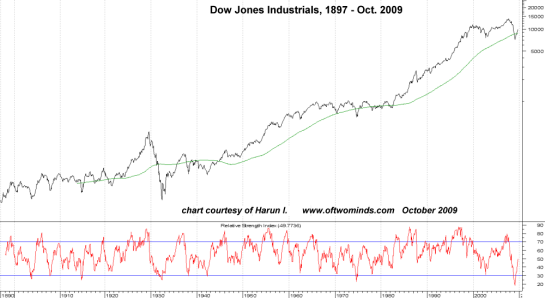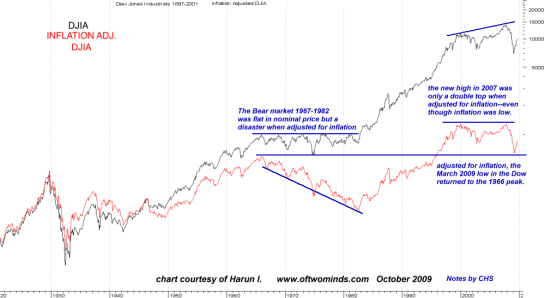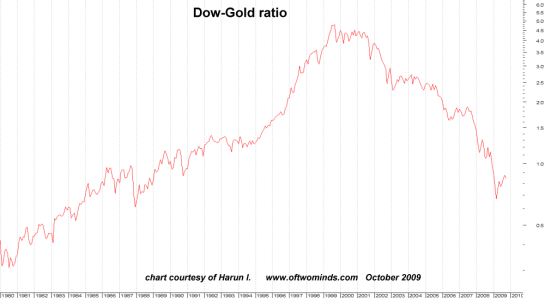Is a flight from cash contributing to an over-inflation in stock prices? – Ilene
Stocks, Inflation, Speculation, Desperation
Courtesy of Charles Hugh Smith Of Two Minds
Frequent contributor Harun I. submitted a chart of the Dow Jones Industrial Average from 1897 to the present. This is of course priced in nominal (not adjusted for inflation) dollars. Curious about what the chart would look like adjusted for inflation, I asked Harun if he could conjure up such a chart, and he kindly produced an inflation-adjusted Dow.
Now before we look at the charts, we should note the many ways both the Dow and the rate of inflation have been massaged (or manipulated); weak stocks are pulled from the Dow 30 and replaced with stronger companies, and inflation has generally been under-reported by tricks such as overweighting "owner’s equivalent rent" (some 40% of of the CPI calculation) and other suspect methods of calculation.
Be that as it may, the charts paint an unambiguous picture of a tremendous loss of purchasing power in the stock market as reflected by the Dow 30. We start with the nominal Dow, with a 200-month simple moving average line.

Click on chart for a larger version in a new browser window.
Next up, the Dow adjusted for inflation.

Click on chart for a larger version in a new browser window.
Notice how the inflation-adjusted price actually touched the 1966 high.
Even though stocks traded sideways during the 1967-1982 Bear market, adjusted for inflation the Dow lost a tremendous amount of purchasing power.
The recent nominal high in 2007 is revealed as no more than a double top when adjusted for inflation.
Next, the Dow -gold ratio (the Dow priced in gold).

Click on chart for a larger version in a new browser window.
Priced in gold, the Dow returned to 1987 levels of valuation.
These charts make me wonder if the rampant speculation we see in every layer of the economy isn’t just a reflection of (normal) human greed but a reflection of a desperation to catch up/not fall behind. In other words, investing "for the long run" hasn’t increased purchasing power as much as nominal prices suggest. Perhaps people sense they’re falling behind in actual purchasing value of their money and assets, and as wages have actually dropped for most workers since 1973, then the loss of purchasing power is in effect doubled.
Sensing that they are falling behind, perhaps people are stepping up to the roulette wheel in a desperate bid to catch up and restore the purchasing power of their money and assets.
There is no gambler more desperate than the one who has lost a number of bets. It is not greed driving his betting so much as a desperation to recover what has been lost. Perhaps that is the underlying zeitgeist of the U.S. real estate and financial markets alike.
Check out my article in American Conservative Magazine No Easy Money: The case for raising interest rates.




